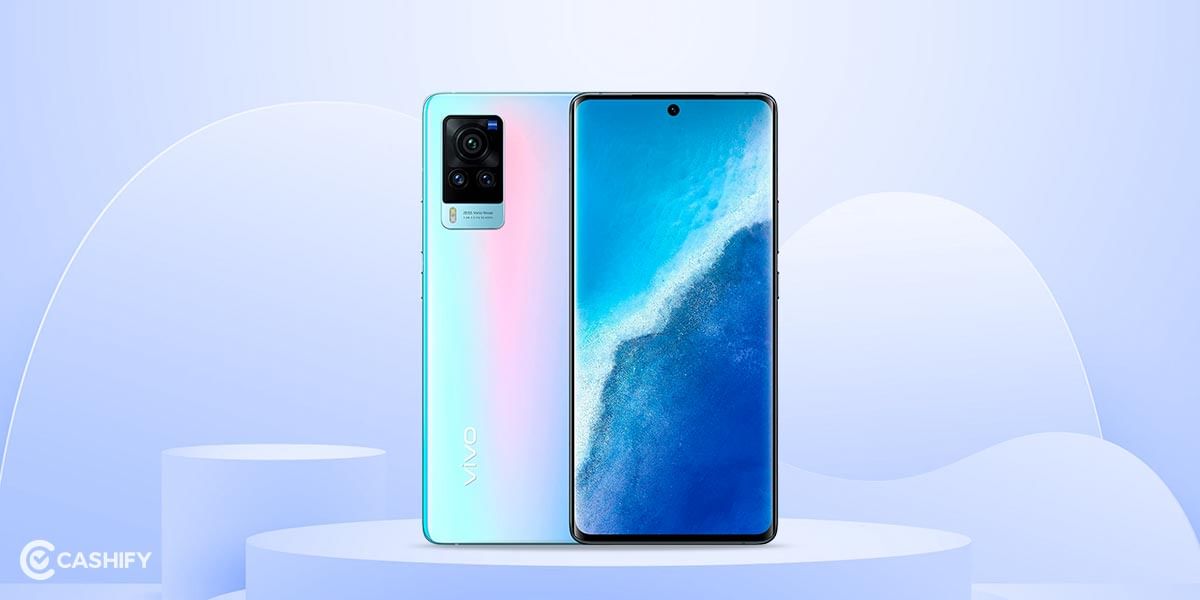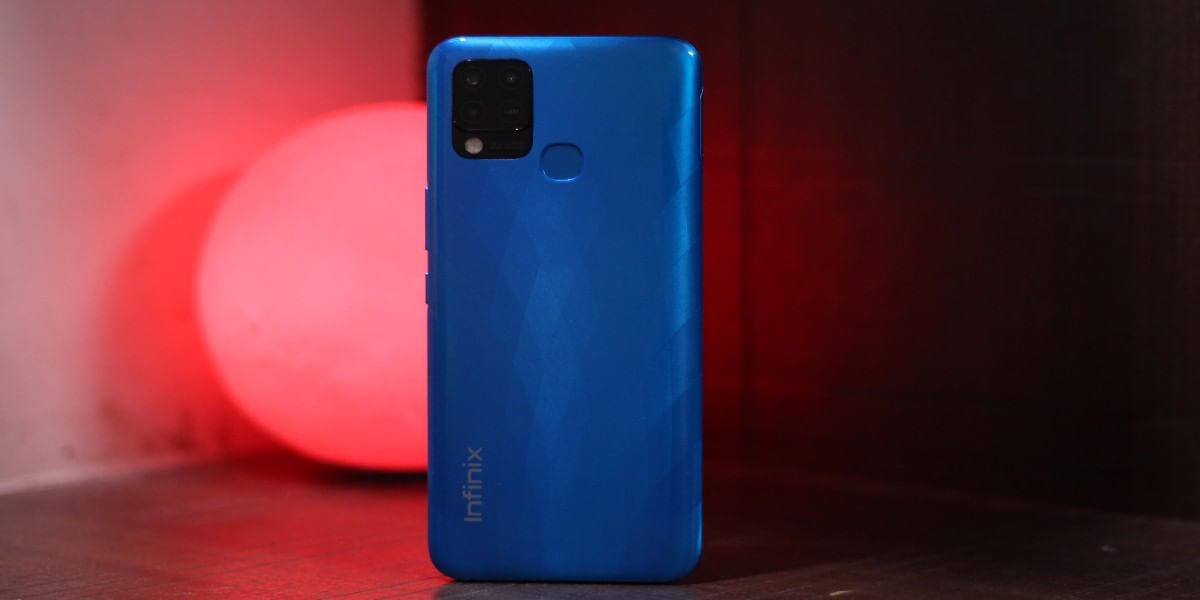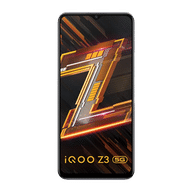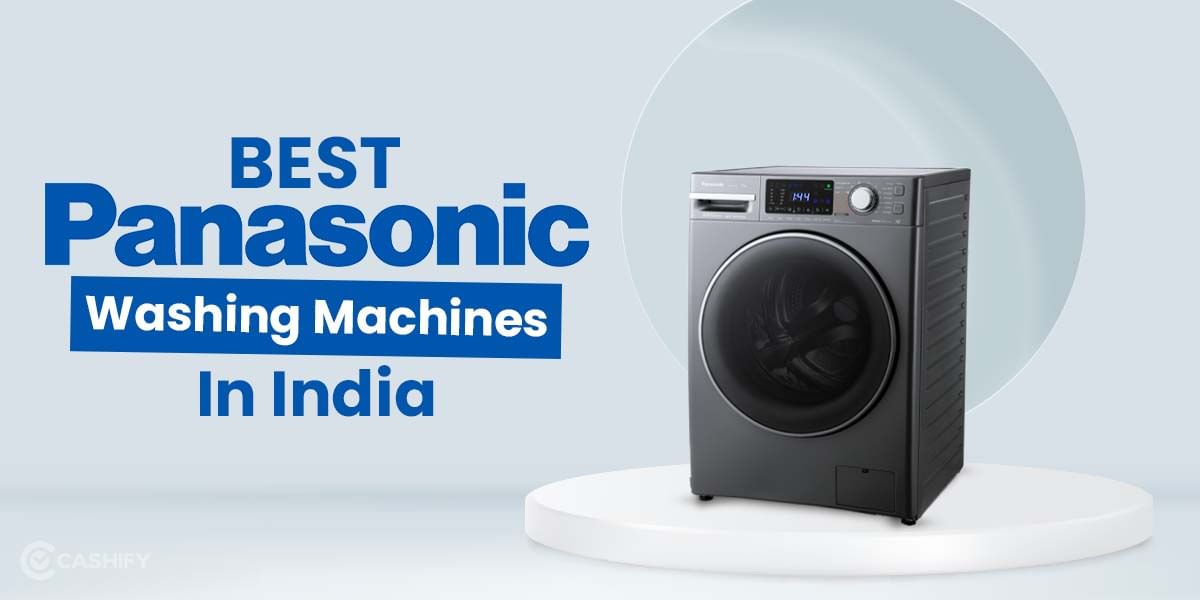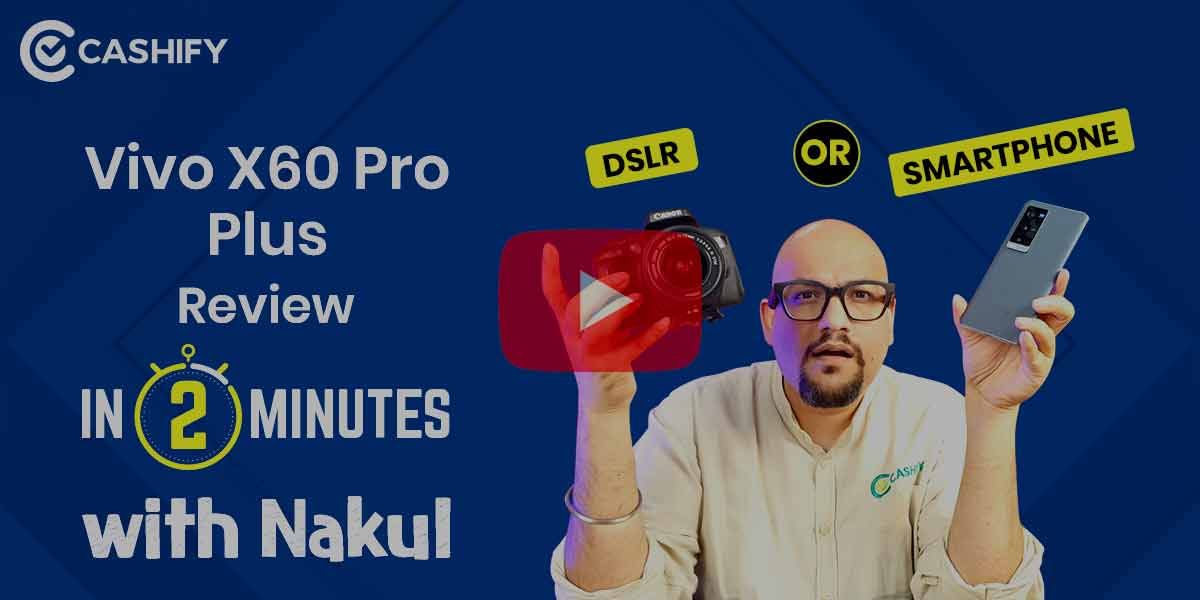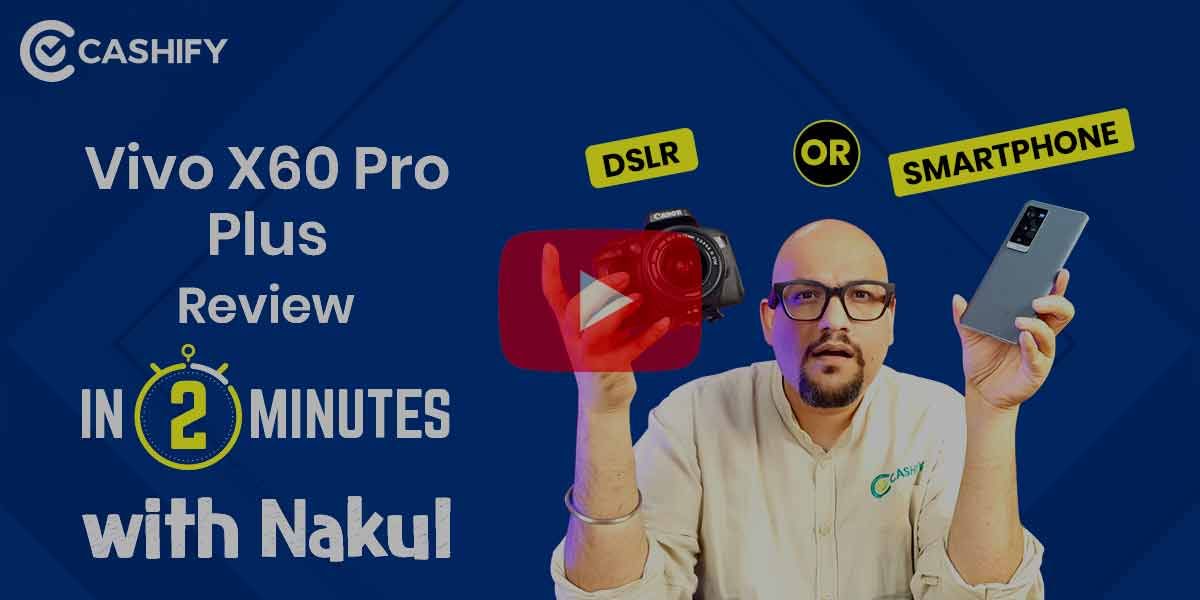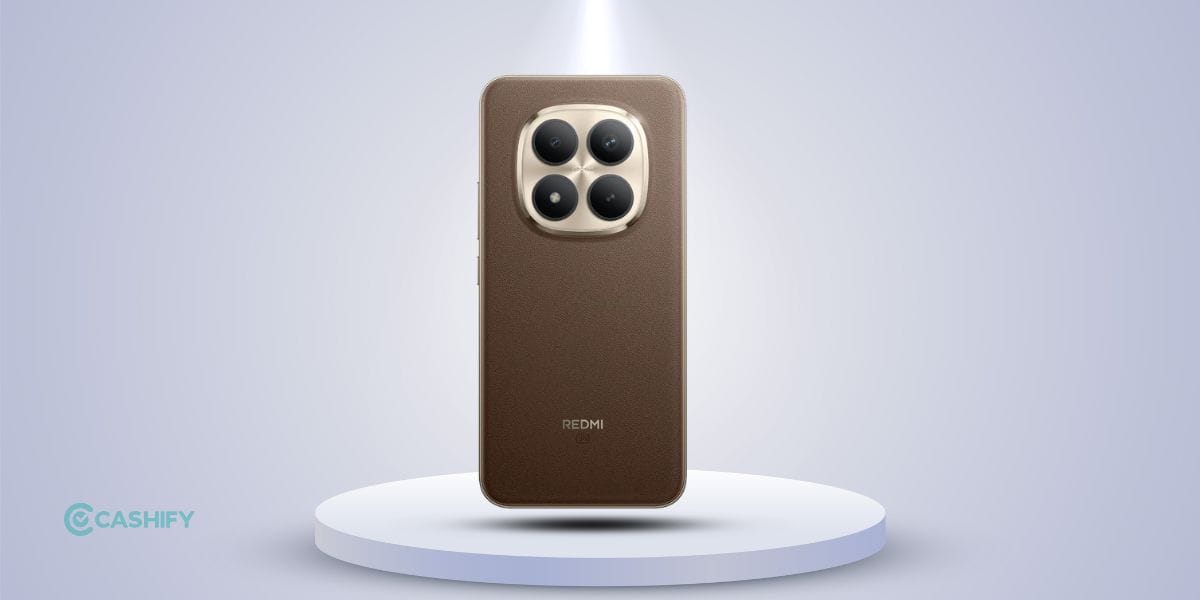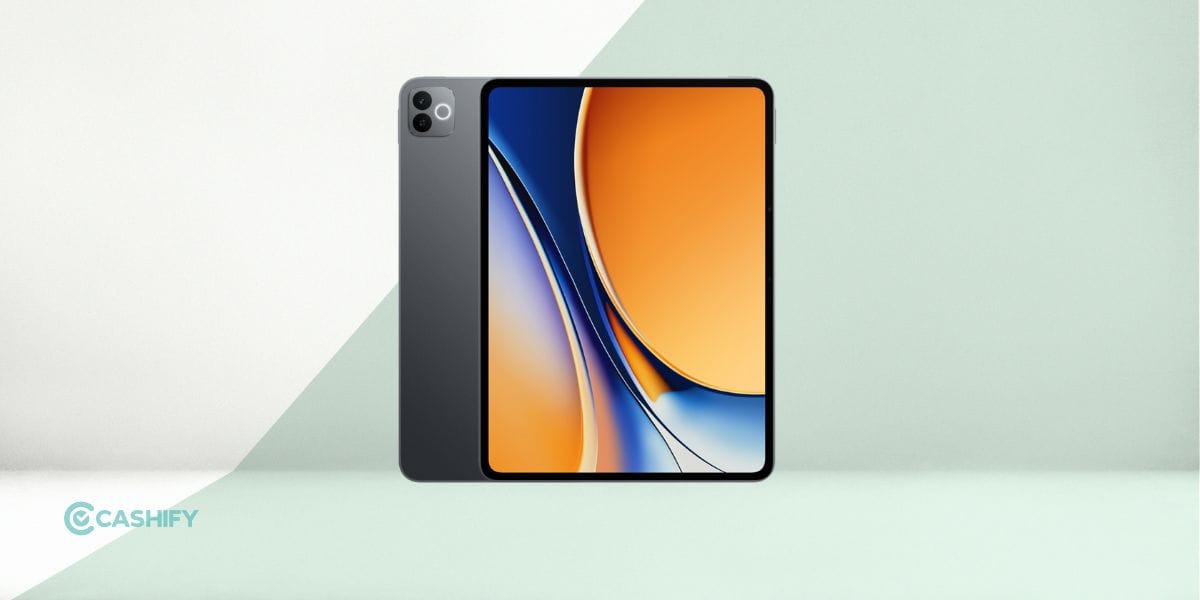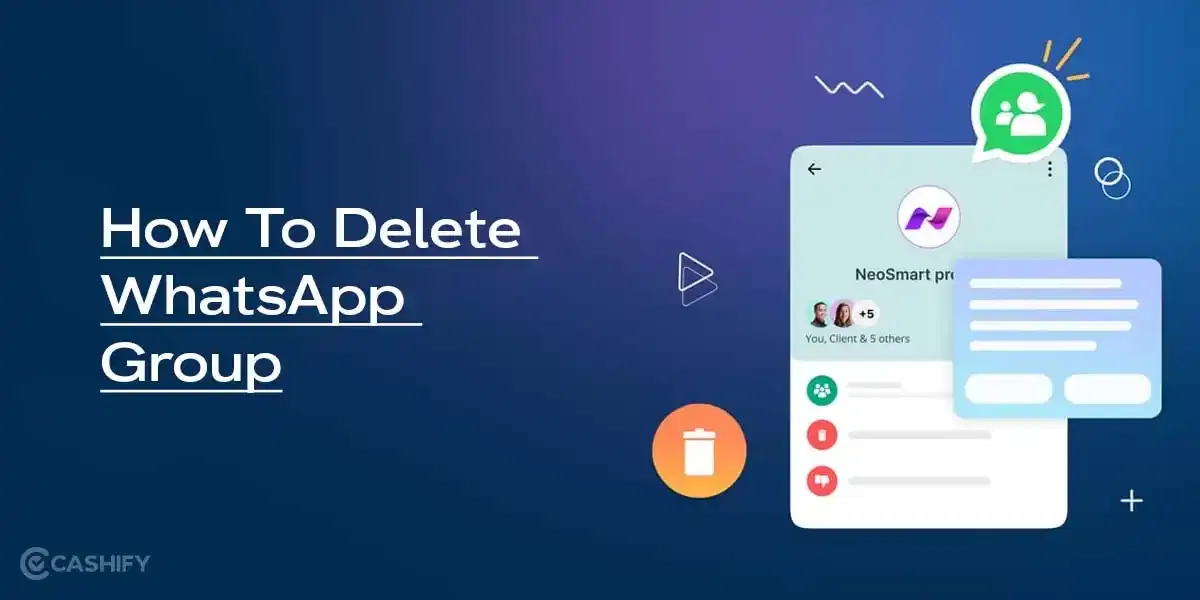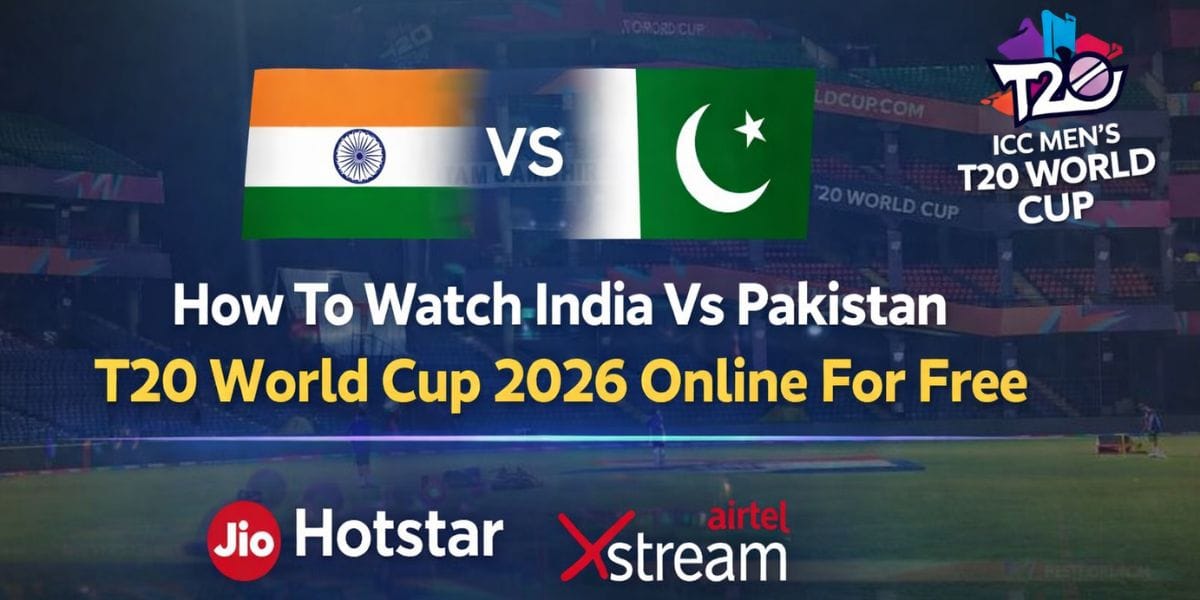Introduction
It’s safe to say! What started as a gaming dedicated smartphone offering is now turning into a brilliant overall package. After releasing the iQOO 7 series, Vivo’s sub-brand iQOO is here in India with their first mid-range smartphone, iQOO Z3 5G. And today we are going to review the same for you.
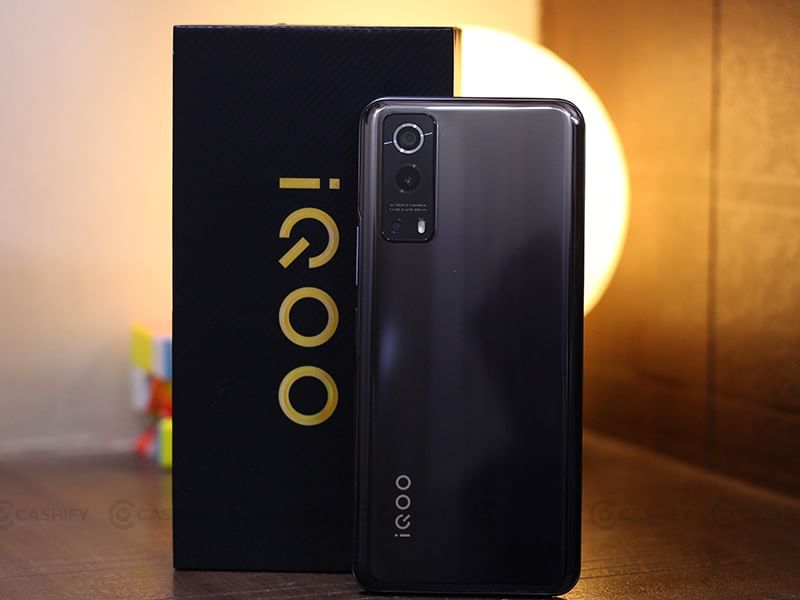
Also Read: iQOO 7 Full Review
The third launch of iQOO has arrived in our hands, and we have been using it for less than a week. I have a ton of thoughts about the iQOO z3 5G launch in India. Let’s dive into details.
Oh, Wait! Recycle Your Old Phone, Get Rewarded!
Prices in India, Variants, Availability
In India, iQOO Z3 5G price starts at Rs.19,990 for the 6GB/128GB model, Rs.20,990 for the 8GB/128GB model, and Rs 22,990 for the 8GB/256GB model. iQOO Z3 has been launched in two colour options including ace black and cyber blue. Starting today, the phone will be available on Amazon India and the iQOO website. ICICI Bank credit and debit cardholders will receive a Rs.1,500 discount on the phone.
Box Contents
I must say I am totally in love with the box packaging of iQOO Z3. it’s a dark blue with iQOO printed in yellow and the device name along with the side cuts of the box. On the rear, you see the Made in India tag. On unboxing the device, iQOO Z3 box contents include:
- iQOO Z3 in Ace Black colour
- Transparent plastic cover
- 55W Vivo Flash Charger
- USB Type-C cable
- Documentation
- Sim ejector tool
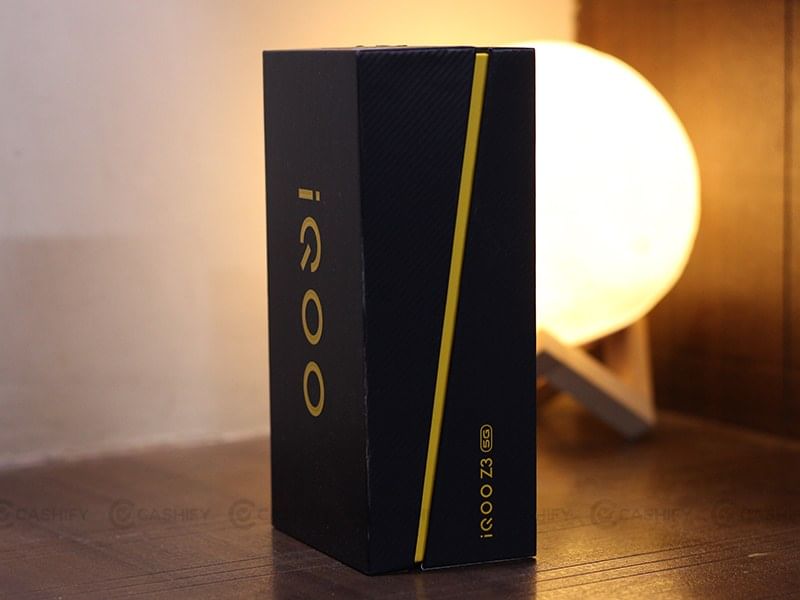
Specs at a glance
Before we talk in detail about the iQOO Z3 5G let’s see what the on-paper specs look like?
- Display: 6.58-inches IPS LCD FHD+ 120Hz display
- Processor: Qualcomm Snapdragon 768G 5G
- Storage: 6GB/128GB, 8GB/128GB, 8GB/256GB
- Software: Funtouch OS 11.1 Global (Based on Android 11)
- Rear cameras: 64MP Primary Camera
- Battery: 4,440 mAh, 55W FlashCharge
- Weight: 185g
- Dimensions: 16.39 x 7.53 x 0.85 cm
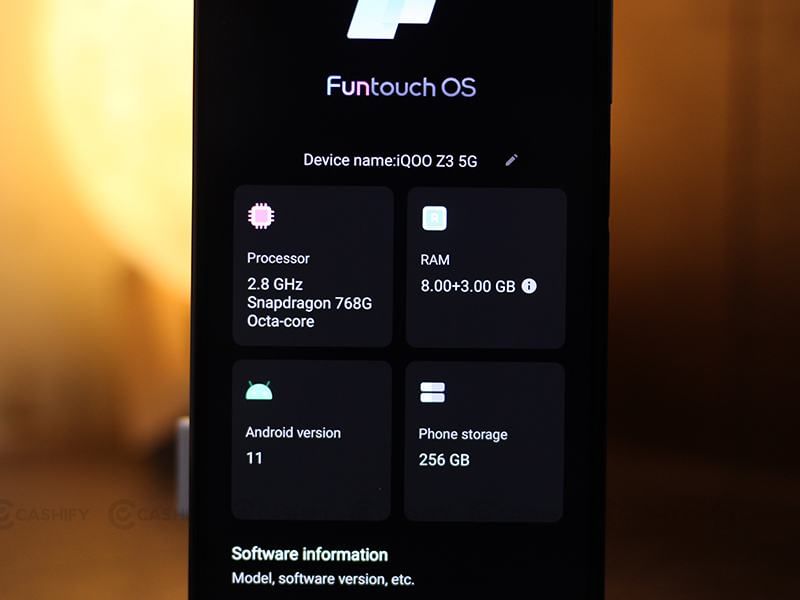
Design - Leaves me asking for more
iQOO Z3’s design is defined by the rectangular camera cut-out, the same as seen on the iQOO 7 series. The only major difference is the iQOO logo is now sitting on the bottom corner instead of just below the camera array. I find it appealing. It’s a clean back. Here iQOO seems to stick to rectangular camera arrays, instead of centre camera modules. Even the first iQOO 3 came with similar rear aesthetics.
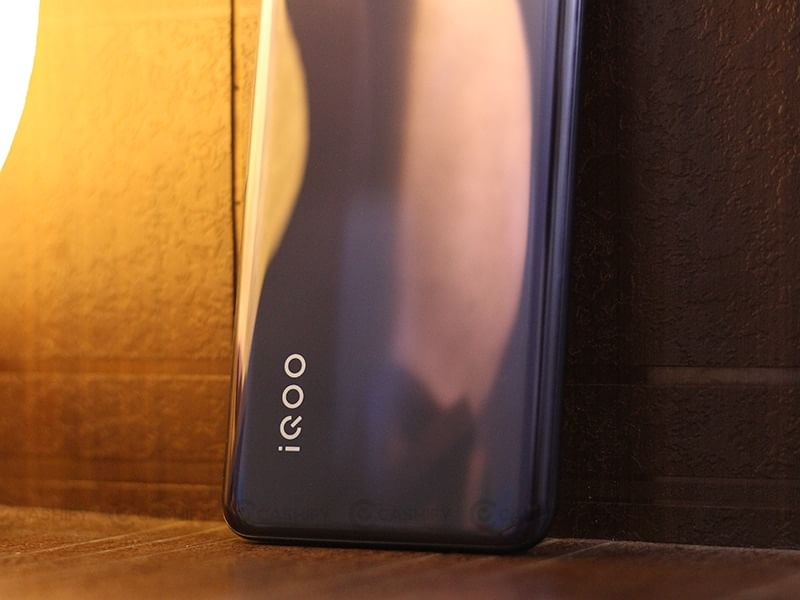
Now iQOO Z3 comes in two colours, Ace Black and Cyber Blue, we have got the Ace Black unit with us. An important fact, the camera module is not too protruding, which means it doesn’t fumble as much when kept on the surface.
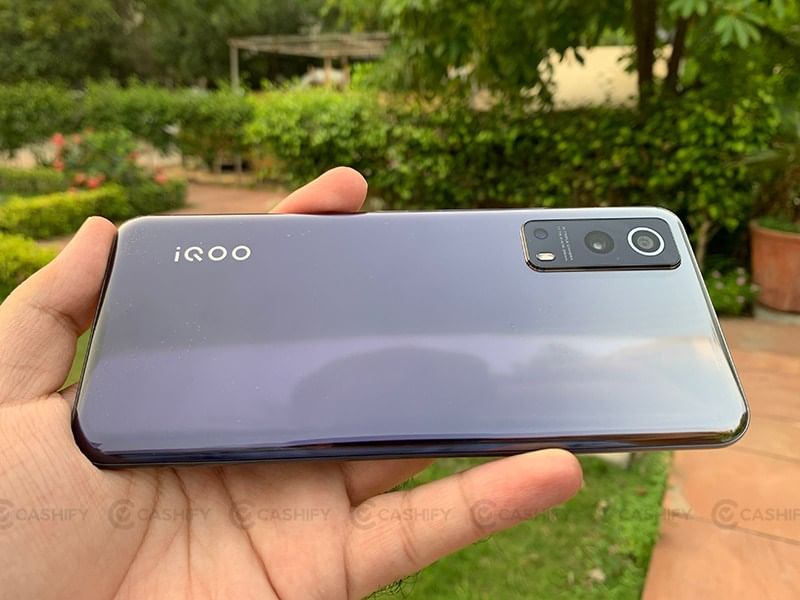
Talking about the body, it is made entirely of polycarbonate, which is not a bad thing considering it’s built so well. The dimensions are more or less similar to iQOO 7 with a tiny bit of weight change, probably because of a slightly smaller display. More on that later! The rear looks elegant if not fancy.
A fun fact about the phone’s design and weight distribution, it can stand on its own! All it needs is a plain surface. Both on top and bottom edges are designed in such a manner that makes this phone stand on its own.
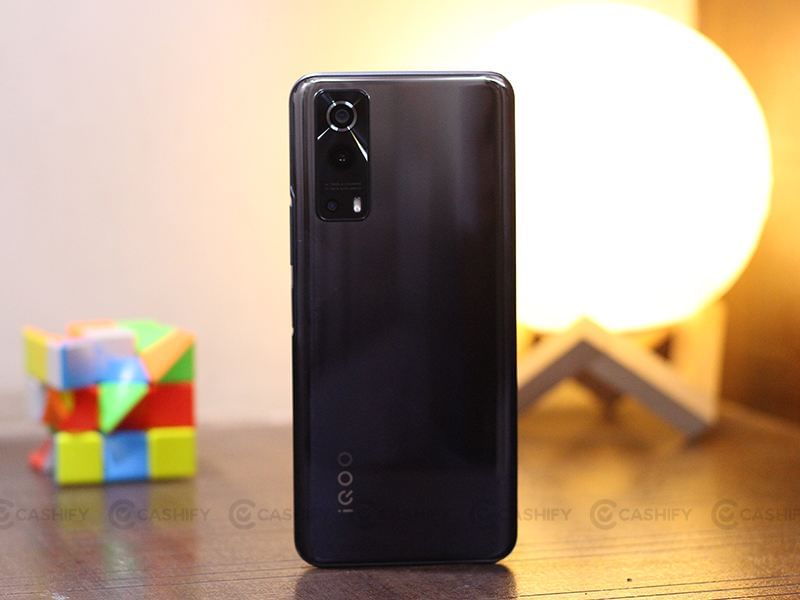
Looks like iQOO has embraced the appeal of iQOO 3 and that can certainly be seen on its Z3 model. This fairly big phone is gentle on the hands as the rear curves make it easier. Further, the weight distribution of the phone is fantastic. For the record, it weighs 185 grams and has a thickness of 8.5mm, which is in the same alley as most phones these days.
Speaking about the fingerprint sensor, which is placed on the power button, is easy to reach and fast to unlock. Also, the face unlock works fast too. The one thing that I noticed missing from the design is the notification LED. As far as the tactile feedback, iQOO has impressed us again, the power button, and volume rocker keys offer a fairly nice clicky feel. A dedicated assistant button would have been nice, though.
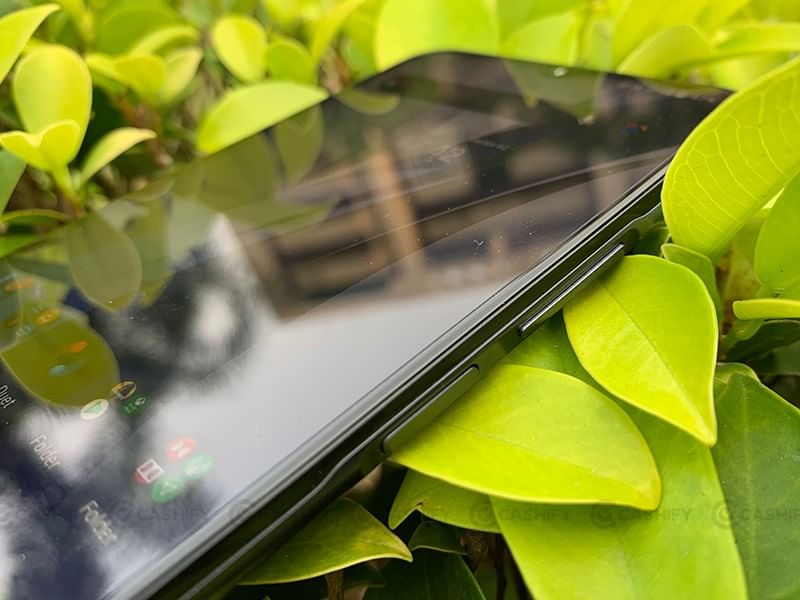
Planning to upgrade? Sell Your Old Phone in 60 Seconds From Home
Notably, you also get a headphone jack on the bottom edge along with a Type-C port, mic, and a speaker grille at the bottom. On the top edge, you get a SIM slot and a secondary mic. Overall, the iQOO Z3 is a well-put-together smartphone in a typical iQOO fashion. But it does leave you asking for more. I would have preferred a textured back instead of a glass-tic back, which isn’t too slippery but it does leave a lot of fingerprint smudges.
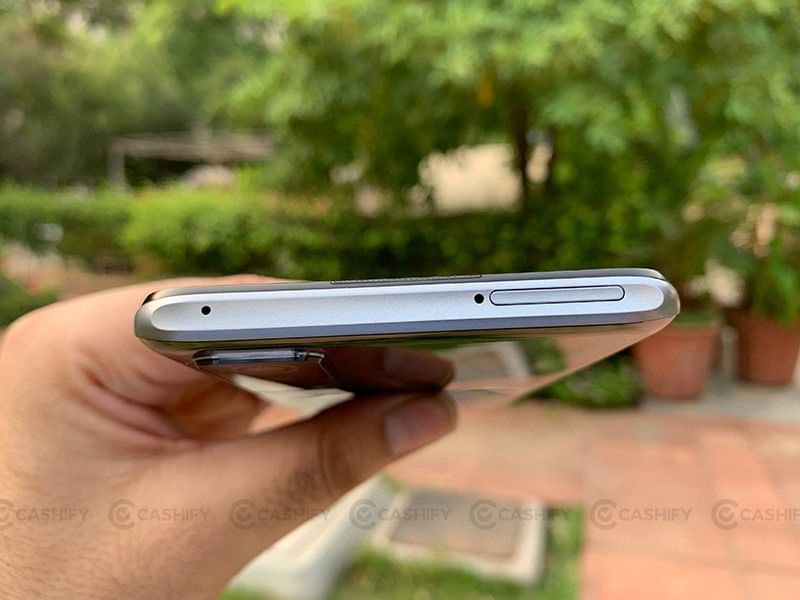
Fantastic Amalgamation of LCD Panel with 120Hz Display
As for the display, the iQOO Z3 has a 6.58-inch IPS LCD panel with a 1080p resolution and a 120Hz refresh rate. It is a good-looking panel with good colour reproduction. I didn’t find any display issues such as screen smearing, screen bleeding, or any type of discolouration. But when you compared it with an AMOLED 120Hz display, it wasn’t as appealing in terms of brightness. This I noticed when I watched the Venom 2 trailer side-by-side on iQOO Z3 and the OnePlus 8.
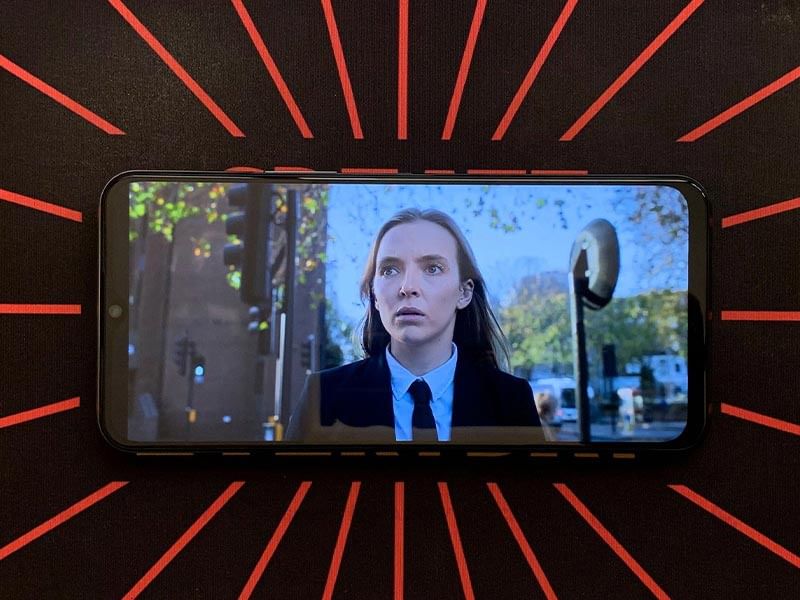
Speaking about the Widevine, it has L1 support and offers streaming in HDR content as it was able to play 1080p at 60fps in HDR. I played the famous Costa Rica video where you can see the colours in their full strength.
Notably, the display offers a screen in three different refresh rates, 60Hz, 90Hz, and 120Hz. Also, there’s a smart switch feature, which claims to offer the most appropriate screen refresh rate automatically according to the actual usage scenario and system power consumption. What it means is it adjusts the screen refresh rate according to your smartphone usage behaviour to offer the best battery life and viewing experience.
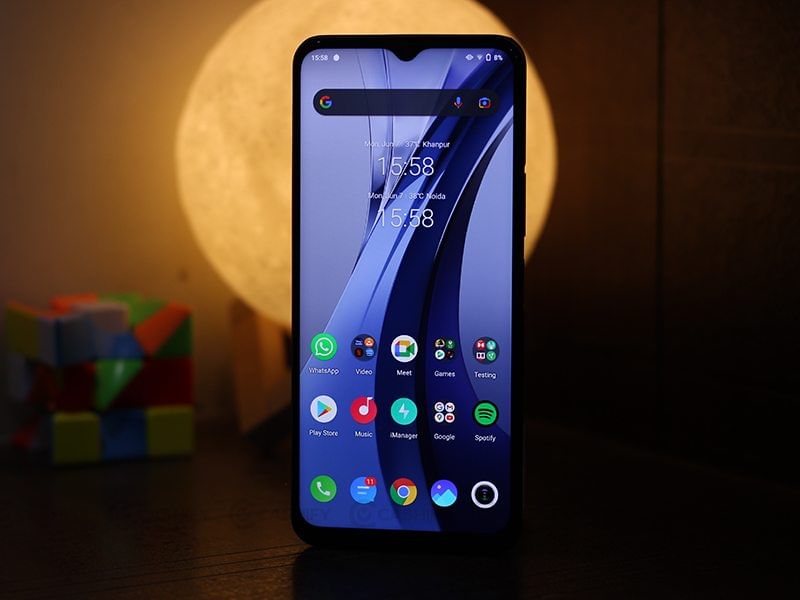
Broke Your Old Phone Screen?
– Affordable Display Replacement at Home
I always prefer using the phone at 50% brightness, but with iOOO Z3 I had to crank it up to 100%. It’s not a super bright display. Overall, I found the display on Z3 to be a fantastic amalgamation of an LCD panel with a high refresh rate.
Magnificent Daily Driver
iQOO Z3 comes with Snapdragon 768G SoC and 6GB/8GB of RAM with 128GB/256GB of internal storage with UFS 2.2 speeds to go along with it. Further, you get an expansion slot for additional storage in the Hybrid slot tray.
Talking about the performance of Snapdragon 768G, it is India’s first 768G processor-powered smartphone. To keep things in perspective, it is supposed to be 15% more powerful and efficient when compared to last year’s Snapdragon 765G. We saw this chipset in handsets like OnePlus Nord and Vivo X50 Pro. It was a fairly capable processor. The successor seems to be doing fine as well.
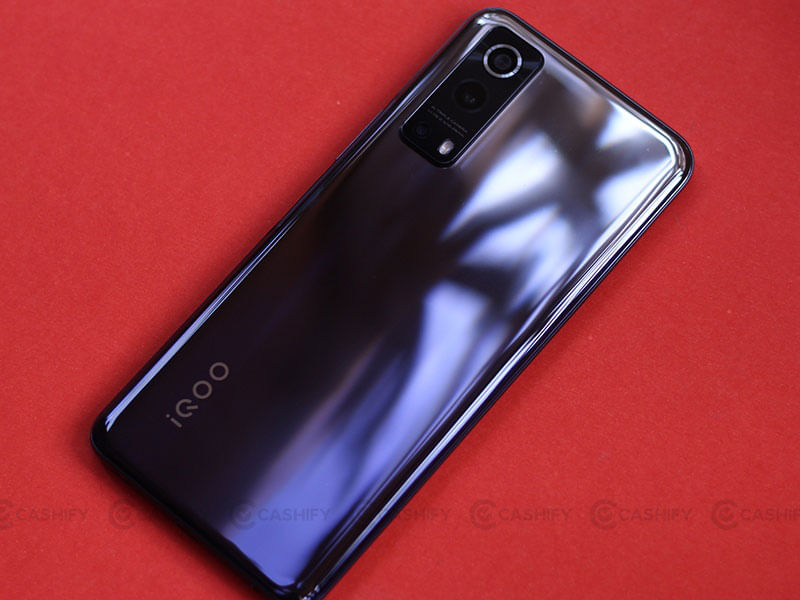
In terms of daily tasks, I didn’t face any major lags to report. It was responsive to all my daily usage requirements. I kept it on my toes by consistent usage of social media apps and plenty of consumption of web series over the weekend. The RAM management wasn’t aggressive either. It keeps the recent app running in the background.
Check Out: All That You Need To Know About iQOO 7 FAQs
For people waiting for some synthetic testing, here you go with the ANTUTU benchmark scores below.
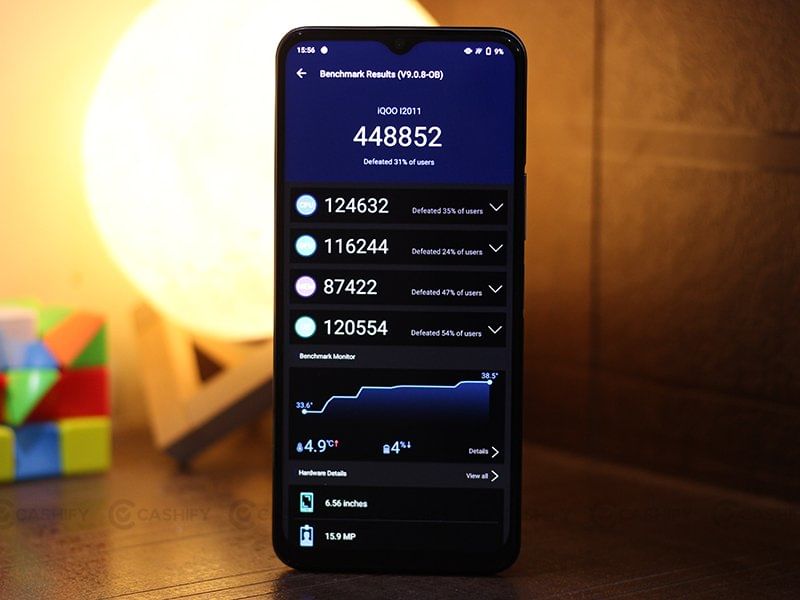
Now it’s time to talk about gaming on iQOO Z3. It does a magnificent job of keeping up with frame loads regardless of the game you are playing. I mostly played COD Mobile and found haptic feedback quite impressive. The battery life holds well after 30 minutes of gaming, further, it doesn’t get uncomfortably warm after continuous gaming. We will talk about it more in our dedicated gaming review of iQOO Z3.
Overall, the iQOO Z3 offers marvellous performance as far as daily usage, gaming, and any heat-duty tasks are concerned. But what about the software user experience? Well, we have a dedicated section for that.
Reliving Software Experience (but with bloatware)
One reason why most Android users don’t gravitate towards an iQOO smartphone is the Funtouch OS. With the custom OS, many still believe that iQOO should introduce a new skin. I’m happy to report that Funtouch OS 11 is nothing like last year’s version. So, essentially you get a new custom skin, but only the branding remains the same. Further, using the Vivo software on iQOO ensures that there are timely software updates supplied. The company claims to offer major software updates for two years and security patches for three years. This has become standard in the Android world. But some brands are offering extra years of updates. You know I’m talking about whom!
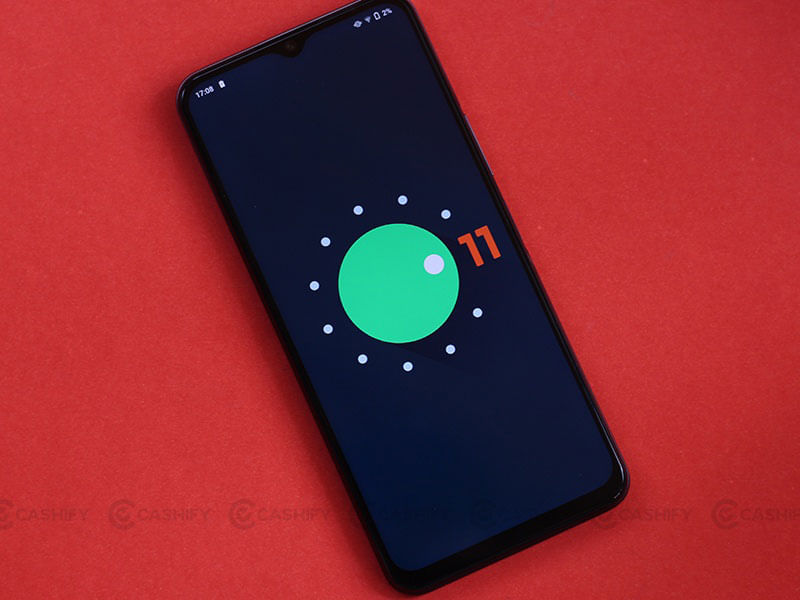
Interestingly, during the review period, I received a software update! Good job, iQOO.
The last phone that I have reviewed was Vivo X60 Pro, maybe that could be the reason why I don’t have any major issues with how the UI looks on iQOO Z3. Anyway, the most important part of software experience is more than just about the looks, but the intuitiveness of the UX. And I found Funtouch OS 11 to be quite responsive to my abilities to navigate the system.
Speaking about the newfound finesse on custom skins, these days many brands have tried to minimize the bloatware and ads experience by giving freedom of opting out from the same. Like you can opt-out of the dynamic wallpapers on your lock screen.
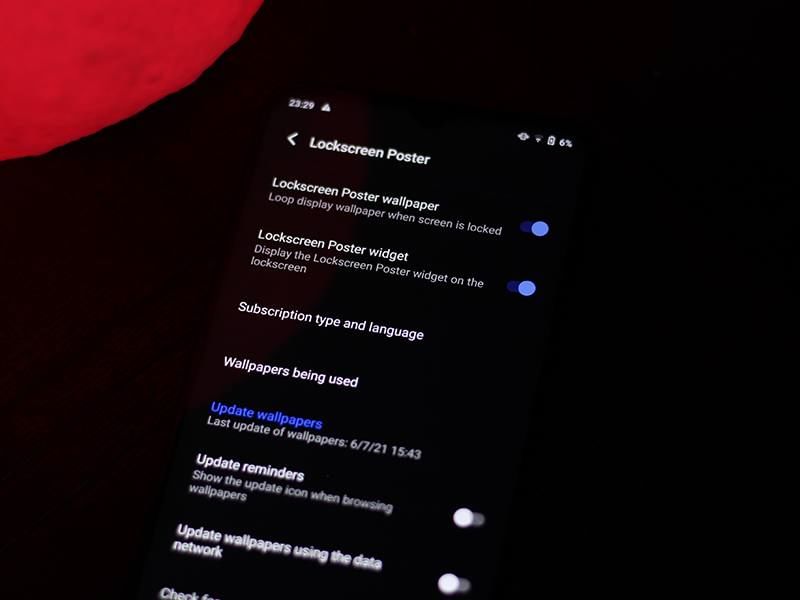
While for people concerned about bloatware apps like V-store, themes, hot games, and hot apps. They should just turn off the notifications for these apps as I did. After that, you won’t be disturbed by them at all. Unfortunately, you can not remove system apps. While you can remove the pre-installed third-party apps like Snapchat, Daily hunt, Moj, Netflix, and Facebook.
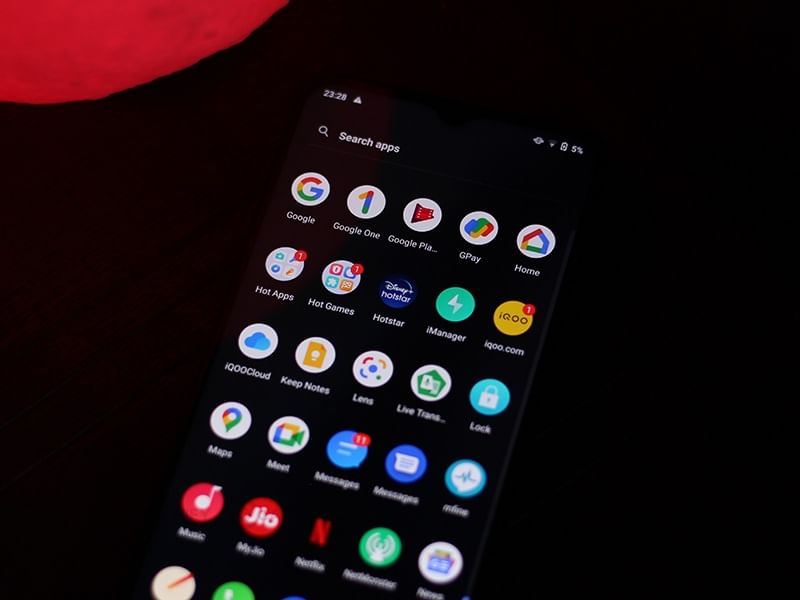
And thus it has made me rethink should I rise from the love of stock Android? Well, let’s keep that debate for some other time.
Overall, the software experience was liberating and there’s no denying that it comes with bloatware, but might end up enjoying the software features, it will be a relieving experience for any new smartphone buyer in the market.
Cameras
The iQOO Z3 comes with a triple-camera setup on the rear. This stack includes a 64MP GW3 main camera, 8MP ultra-wide shooter, and finally a 2MP macro sensor. On the front, it has a 16MP Samsung 3P9 selfie camera. Speaking about the improvement from the predecessor, you get the larger megapixel main camera, apart from that there’s no difference in camera stack. And that’s where we felt it needed to improve.
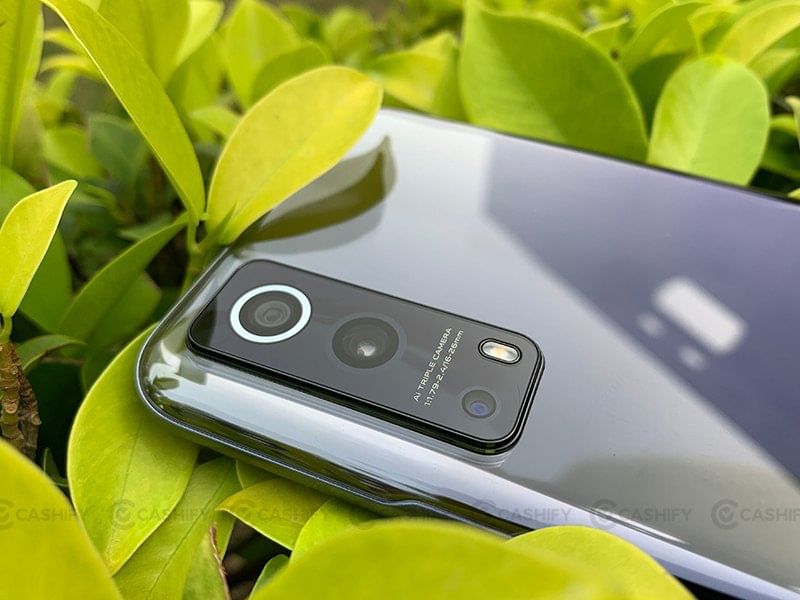
Looking for the Best Camera Phone?
– Vivo X60 Pro Plus Quick Review in 2 Minutes
Let’s check and talk about the camera samples from iQOO Z3 below.
Right off the bat, let’s compare the 64MP shots with 16MP shots from the Z3. Here you can see the surface grass is greener on the 64MP shot compared to 16MP. Further, it’s also noticeable that colour contrast levels are higher on the higher resolution capture. So, everything’s in place and the landscape shots look decent. Note that they were captured on a cloudy day.
Now, these I captured from the ground. Here I wanted to find out what difference HDR mode makes, and to my surprise, I could hardly find any difference. Both the images look the same in terms of colour saturation, contrast, and sharpness. Don’t know what sorcery is happening here.
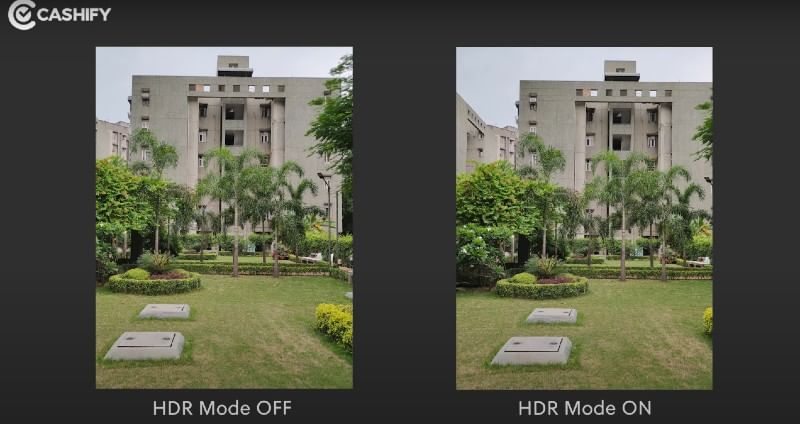
Let’s move on to flower shots to better understand the dynamic range capabilities of this camera. Speaking about these pink flower shots, when you zoom at those petals in the centre, it’s again clear that HDR isn’t making colours brighter, or doing anything here. HDR Mode feels like a dummy mode. Irrespective of the fact that I have no complaints about the colour science of the HDR comparison shots we have talked about so far. The camera samples of flowers look true to the source. I came to the same conclusion even for the second set of flower shots. It’s baffling to notice no major or minor differences between HDR and Non-HDR shots.
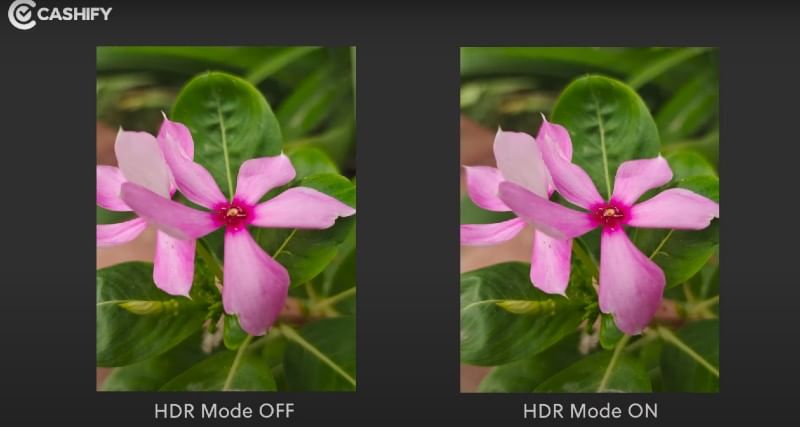
Now let’s talk about the zoom capabilities of the sensor, where we will also take the opportunity to speak about the Ultra-wide shot. Starting with an ultra-wide shot, the first sight of this shot gives a good feeling, but when you zoom into it the real truth comes out. As you can see, the picture isn’t as sharp as it showcases to be. The crispy details are missing from all corners and the centre of the photo.
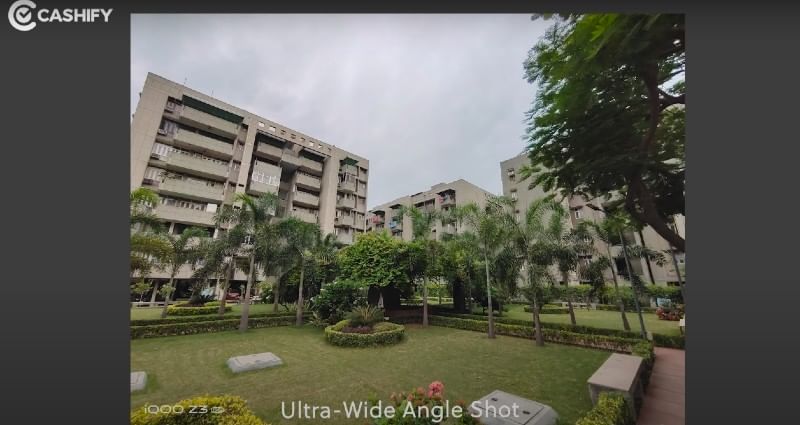
Now when you look at the regular shot, the details are crispier compared to ultra-wide, it’s much more colourful too. Now when you start zooming in, 2X, 5X, and 10X. The details start to degrade massively, and the picture doesn’t come out well. Things would have been different if there was optical zoom present.
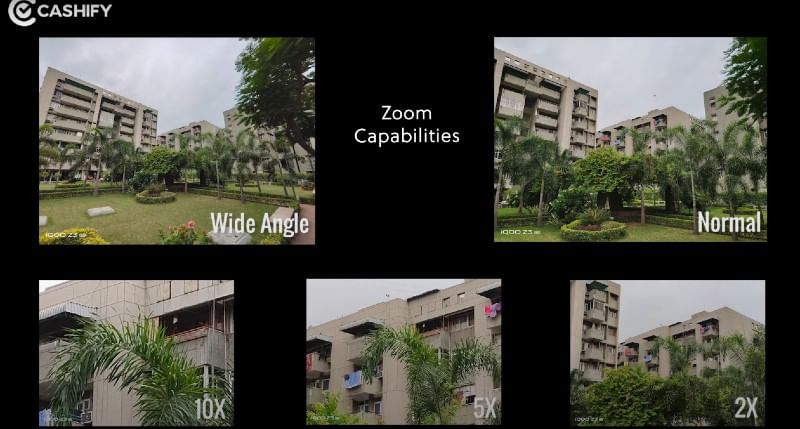
I’m saying this again for the last time, why do we need a 2MP macro sensor or any 2MP sensor for that matter. You can take a look at these close-up shots, one taken from the macro sensor and another from the primary sensor with 2X zoom. There’s a huge colour difference between the macro sensor and the primary sensor. The leaf colour is true to the source in a 2X zoom shot, while the macro sensor failed to offer true colours. This is when there’s no major difference in terms of details. So ergo! A low-res macro sensor is a wasted opportunity.
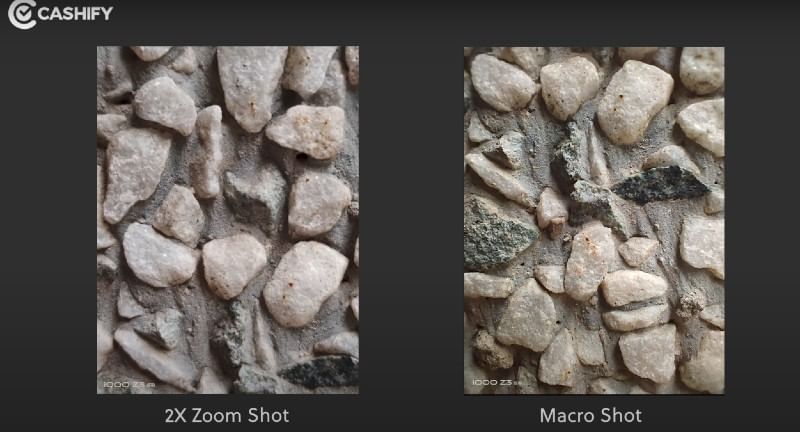
It’s time for you to show some low-light shots! We took samples in normal mode, with fill light, and flashlight to understand the differences and best mode to capture in low light. Take a look at this hot wheels car. The fill light mode keeps it cool while the flashlight captures it in warmer tones. Detail is visible in almost all modes, while colours of the car come out great in warm tones.
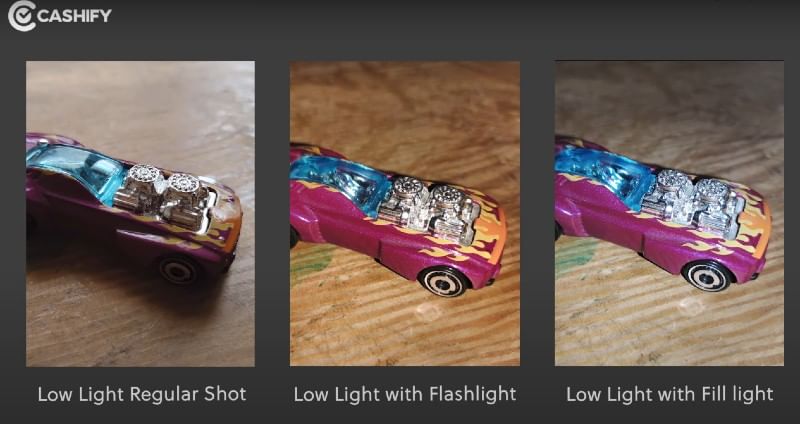
Moving on to selfies, the 16MP shooter does its job pretty fine as you can see in these side-by-side photos. The colours look true to the source, and the details are good too. The skin tone is almost close to the source. While speaking about the portrait mode, the bokeh cutouts look almost perfect, but there’s a slight disproportion going on the hairs on the top of the head. Even the selfies in artificial light look good. Overall, it’s a decent selfie camera and won’t disappoint you.
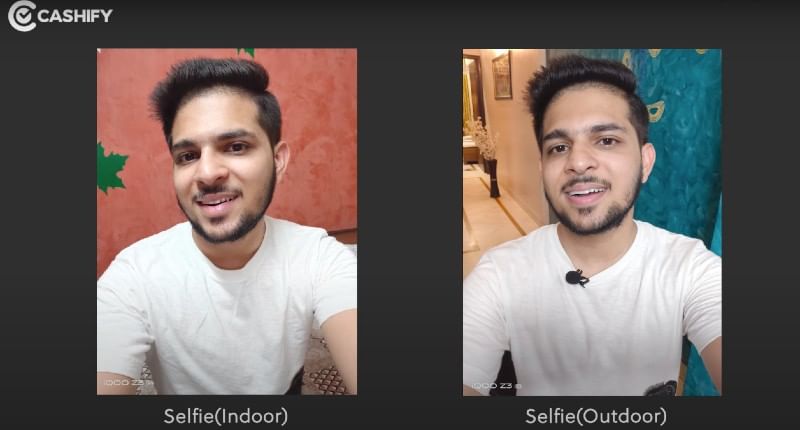
Finally, speaking about the video capabilities, it can shoot up to 4K 60fps, but here’s a sample of 4K 30fps, which looks decent. Now here’s a 1080p video with standard and ultra stabilization playing side-by-side. You can see ultra-stable mode is not a gimmick. It even maintains the sharpness and colours. I approve of the video quality. It’s good.
Surprising Battery Performance
Now, about the battery department, it has a 4400mAh capacity battery, which might not be considered large anymore. But we believe that’s more than sufficient for all types of usage. Why do I state that? Well, you will be surprised to know as I was.
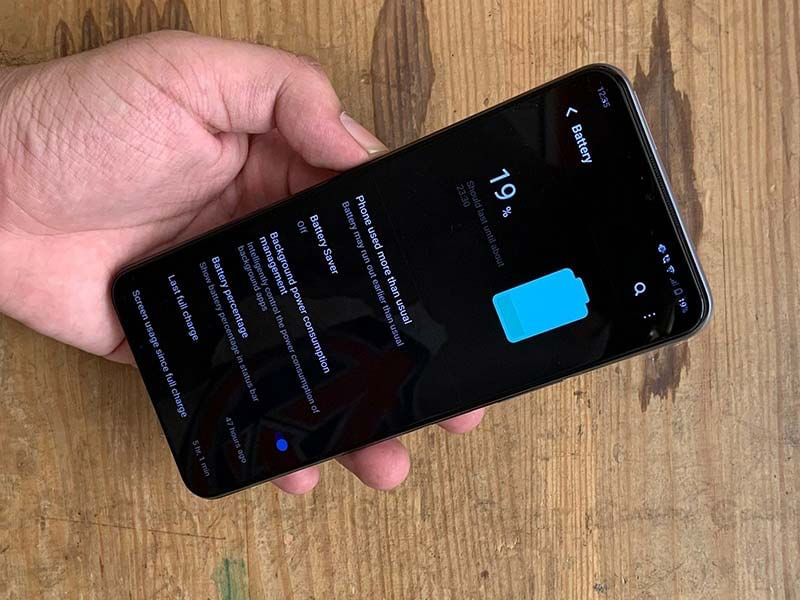
Frustrated with a draining battery? Affordable Mobile Battery Replacement at Doorstep
The 4400mAh battery on the iQOO Z3 gave me more than 8 hours of screen time on occasions of heavy media apps usage such as Prime Video, Disney+, and YouTube. Mix it with social media app usage, I was able to get more than 24 hours of battery life from this phone. This is quite incredible. Further, speaking about its standby ability, the battery life would only discharge around 3-4% overnight. This is when I had notifications turned on for almost all the apps.
Now if you are an average smartphone user, there are even better numbers to report. A 5-hour screen time was achieved with battery life lasting for around 48 hours. Isn’t that crazy! The battery just won’t die on you.
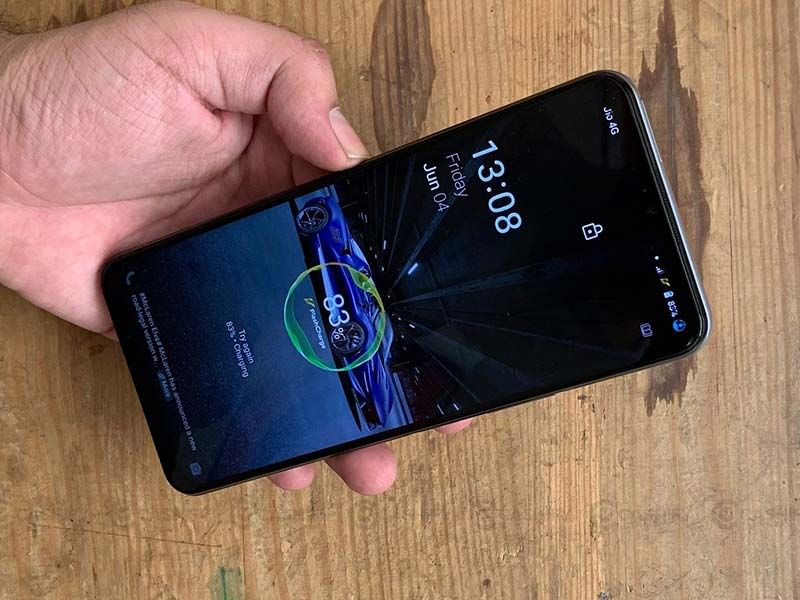
With 55W charging speed, it took exactly 57 minutes to charge from 15% to 100%. It is probably the most idealist fast charging setup available in a mid-range smartphone right now. iQOO has been sticking with a battery capacity of around 4500mAh and I must say I respect their decision. This is also a testimony to the necessary battery optimizations done on Funtouch OS.
Audio, Connectivity, Biometrics
I have one good news and one bad news regarding the audio experience on iQOO Z3. Let’s start with good news. iQOO has added 3.5mm audio jack support, which was originally given on iQOO 3. Now you see the similarities between the iQOO 3 and iQOO Z3.
Now let’s talk about the bad news. Unfortunately, iQOO Z3 doesn’t come with dual stereo speakers. Instead, it comes with a bottom-firing stereo speaker, which isn’t loud enough for gaming or enjoying music/movies on your phone via the speaker.
A side-note; iQOO confirms there is no audio certification like Hi-Res, Hi-Fi, or Dolby Atmos supported on the iQOO Z3.
I used the iQOO Z3 on a Jio 4G network for the duration of my review. And, it fairly rocked solid. But I have my concerns regarding the carrier aggregation on iQOO phones this year. After iQOO 7, this is the second iQOO phone we have been facing problems testing carrier aggregation. As you can see the mobile data is turned ON and the NetMonster app show only 1800 band, not even 2300 in my area.
To be sure of things, I also tried testing the Vodafone SIM card. The carrier aggregation was not working on that as well. But finally, when tested on an Airtel SIM, the 4G+ sign was visible but it supported only a single carrier band.
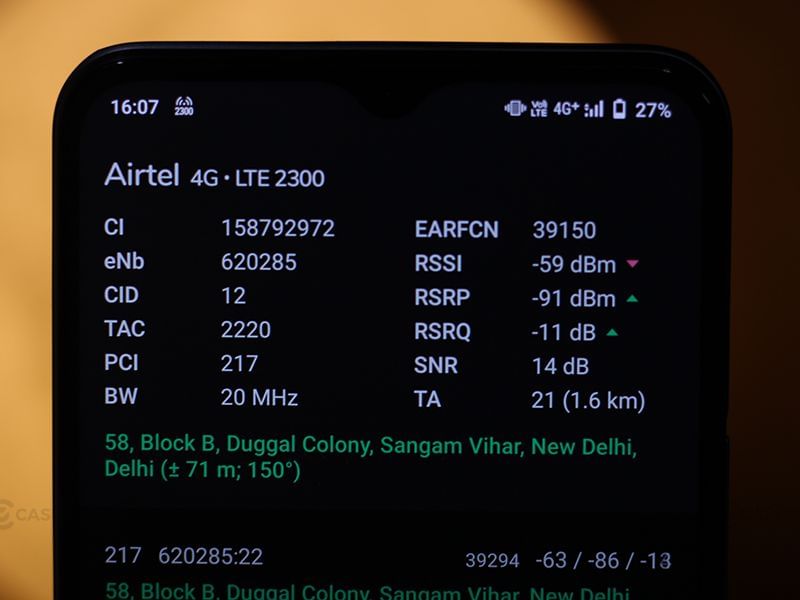
As far as the call connectivity is concerned on Jio and Airtel, I have had no call drop issues, which means network signals were stable.
For people wondering, iQOO Z3 will support n77 and n78 5G bands in India, whenever it’s commercially available in the country. Note that it doesn’t support dual 5G. The dual 5G support is currently available only on flagship chipsets. As for Wi-Fi, it supports dual bands, 2.4GHz, and 5GHz. The Bluetooth connectivity support available on Z3 is the 5.1 version.
Pros & Cons
Pros
- Elegant design
- Brilliant performance
- Competitive pricing
- Excellent battery life with 55W charging
- Assured software updates
Cons
- Old School Water-drop Notch
- Single Speaker Setup
- Single-band carrier aggregation only
- Fingerprint smudges on glossy back
There are many options out there in the market with a budget of around Rs.20,000. The brands like POCO, Xiaomi, Realme, and Motorola enjoy the attention among the smartphone buyers in India in this price range.
But I feel the iQOO Z3 is going to sway the tide in favour of the young mobile maker in 2021. It’s a delight that Z3 is entirely Made in India, just like its sibling iQOO 7 series. The design, performance, camera, and battery life on iQOO Z3 together offer a fantastic package. Would I say it’s fully loaded? Hell yeah!
I have high hopes from the brand that they will keep up the promise of a timely software update. Because after-sales support has the power to break or make the brand.
What do you guys think of the iQOO Z3?


